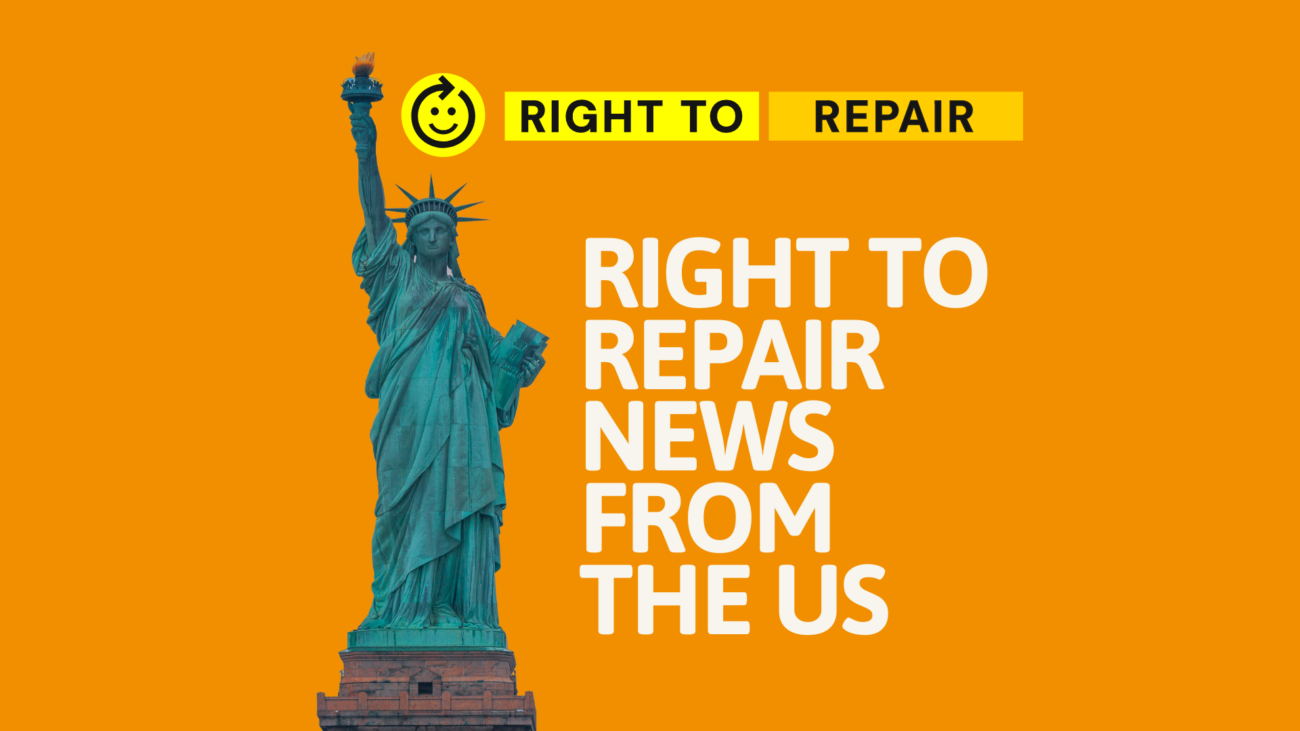Visual: own canva design, picture of the Liberty statue by Aliaksei Skreidzeleu
2023 has started with a bang for Right to Repair in the USA. An important bill was signed in New York and long-standing opponent to R2R – John Deere signed a repair agreement with US farmers. Keep reading for an initial assessment by our US colleagues. 2023 definitely looks promising for repair, but we still need to hold companies accountable on their „pinky promises“ and push for regulation covering all producers and products.
New York’s Right To Repair Act – a big step for repair, but big tech managed to considerably slim it down
As a big part of the world was recovering from their Christmas meals, US activists were fighting an ambitious electronic Right to Repair bill during tense negotiations in New York.
Shortly before the bill was signed (on 28 December 2022!) New York Gov. Kathy Hochul managed to narrow its scope in exchange for her support. The fight for a real and universal right to repair continues, but this is an important step in the right direction!
Nathan Proctor, Senior Director of the Campaign for the Right to Repair at PIRG, said: “Before we talk about exactly what was changed and how, we have to recognize the importance of this step. Passing any law is a huge task. Passing a law with some $10 trillion worth of opponents is something I was told was impossible by the lobbyists who line up against us.”
While the bill is certainly worth celebrating, US activists do regret last minute changes, which considerably reduce the scope of the law. The first version of the bill could have obliged manufacturers of digital electronics such as phones, tablets and IT equipment to provide access to the parts, tools and information needed to repair equipment.
After many industry-induced amendments, the bill now excludes any “product sold under a specific business-to-government or business-to-business contract … not otherwise offered for sale directly by a retail seller,”. Furthermore, the repair bill only applies to products made after 1 July 2023. US headquarters of our campaign member iFixit especially deplore that “the revised language excludes enterprise electronics relied on by schools, hospitals, universities, and data centers” as well as devices currently owned by people.
We’re not surprised by last-minute reduction of ambition by policymakers, as we’ve experienced the same as part of every negotiation in Europe as well. It’s equally to be expected that new legislation wouldn’t apply to existing products – the same is true in the EU, and in fact the delay between approving legislation and the moment it comes into effect is significantly longer in Europe: two years for smartphones, for example. This said, the exclusion of devices supplied in business-to-business and business-to-government contracts is significant. Evidently, also in New York state, Right to Repair is… “still loading”, just as in Europe. We’re also concerned that the bill allows selling assemblies of parts instead of individual components – something we successfully fought against recently for smartphones in Europe.
We are all looking forward to seeing how this will evolve, as other states are already looking at the NY Right to Repair bill for inspiration! With a bit of luck – & a lot of help from the repair movement – upcoming versions will be more ambitious on types of equipment & timelines. We expect 2023 to be an exciting year!
Further reading:
- https://pirg.org/articles/right-to-repair-in-2022-what-happened-in-new-york-and-our-top-accomplishments/
- https://fighttorepair.substack.com/p/ny-governor-bows-to-big-tech-signs
Tractor manufacturer – and long-standing opponent to R2R – John Deere signed a repair agreement with US farmers. Will they actually respect it?
This is a potentially positive development, with John Deere letting independent repairers and farmers disable electronic locks and – hopefully – provide them with the same level of access to repair materials as their own dealers. The agreement comes after years of campaigning from farmers and repair advocates.
With this Memorandum of Understanding, the American Farm Bureau Federation, a US Farmer organisation, has agreed to refrain from promoting further right to repair legislation (at federal or national level) that could go beyond the commitments of the MOU.
Why are activists hesitant? As it was proven by an investigation by VICE and PIRG, in the past manufacturers have already stipulated similar voluntary non-legislative commitments – which in practice they did not honour.
This is why we agree with PIRG Right to Repair Campaign Director Kevin O’Reilly, who said:
“As legislators kick off their 2023 sessions, they should move full steam ahead with their Right to Repair bills and not view this MOU as a sign that the problem is solved. They should continue pushing Right to Repair legislation until every farmer in every state with every brand of equipment can fix every problem with every tractor.”
With our campaign in Europe – exactly as our friends in the US – we want to ensure a universal Right to Repair, not watered down by manufacturers’ own repair initiatives, so frequently aimed at distracting the public and policymakers. We will continue to push for regulation to make this happen – for all products.
Further reading:

